Eggs Devilled with Pepper and Marigold
A seasonal starter popular all over the Kingdoms
- Background
- Recipe
At the beginning of Freelorn’s and his people’s dinner with the proprietor of the Ferry Tavern at the edge of the Waste Unclaimed, this dish is served to the Lady’s guests as what used to be called a “whet”: a starter meant to take a little of the edge off the diners’ immediate hunger while at the same time sharpening it for the courses to follow.
As such dishes go, this one’s relatively simple and quick to prepare. What makes it stand out is a combination of the local spicery—unmistakably Steldene in nature, with its emphasis on combining sharp and arresting flavors—and a touch of the seasonal, with the inclusion of fresh marigold petals. Marigold as a flavoring agent is much used on the eastern side of the Middle Kingdoms’ continent, especially in northern parts, where their version of the common “pot marigold”, Calendula officinalis, comes earliest into bloom (or remains in flower right through the North’s temperate winter).
Though the text describes the preparation of the eggs as “devilled,” this is plainly just a translator’s convenience. On our Earth, the term—its diabolical or infernal associations originally associated with strongly spiced meat dishes—started in the 1800s to creep into usage for other foods, specifically eggs. But whether for meat or not, such usages are nowhere to be found in the Middle Kingdoms. Since the eschatology common to the Four Realms contains no afterlife scenario in which the deeds of the wicked are punished with eternal torment, there are also no devils—and for that matter, no fallen angels.* The actual term used for the eggs would have been the Steldene word miwhitvhej, a pun on an old word for “double-yolked”—the “doubling” here meant to hint at the extra labor involved in producing the dish.
The peppers associated with this recipe in its description are exclusively what Middle Kingdoms cooks would describe as “berry-peppers”; and a great number of spices fall into this category despite neither being berries nor peppers. Mostly (as has been discussed elsewhere), when cooks in the Four Realms use “berry-pepper” as a generic term, they almost always mean our common black peppercorn, Piper nigrum.
In this recipe, though, there’s an implicit suggestion (cf. ingredients listed in Darthene cookery texts such as the famous Endeidwhe hIrrhéillnu) that the cook should feel free to add spice to the dish by playing mix-and-match with their favorite local varieties of berry-pepper. And though we haven’t yet attempted this recipe with Sichuan pepper, that would certainly work well. Complaints in the text from Freelorn’s friend Moris about “the aggressive spices and sours of Steldene food” most likely have more to do with traditional regional-Darthene attitudes toward the Kingdoms’ variant of the Sichuan pepper… which would have turned up either in the goose dish or the parsnips they were served at dinner, and maybe in both. Make no mistake, though: Moris wouldn’t have been complaining about nothing. The Kingdoms’ Xenozanthoxylum microdraconis—containing from six to ten times our Earth’s Sichuan “pepper’s” amount of the capsaicin-analogue hydroxy-alpha-sanshool—packs quite a punch.
As for the other main flavor additive to these eggs: the Wikipedia page for Calendula officinalis describes it as “a short-lived aromatic”, and so it is. Those using it for culinary purposes do best to use it fresh… though it can definitely be used as a dried herb if reconstituted and used soon afterwards. Its flavor and savor are gently peppery, light, and surprisingly fresh. To dishes to which it’s been added, marigold lends a fragrant herbal grace-note that’s evanescent at best.
In an egg dish like this, therefore—routinely served cool or cold, and with a taste, texture and quality that points up seasonings rather than overwhelming them—marigold makes a perfect addition. A favorite foil for it, either in the eggs themselves or on the side as a conserve, is lemon or citron… though when varying the recipe in this way one must be careful not to allow the citrus flavor to overwhelm the delicate flavor of the flower.
See the right hand tab at the top of the page for the recipe.
*The closest that Kingdoms-based folklore gets to this concept is in tales of the medveilh (OArl. “foregoers”), a class of powerful but nonphysical being said to have been created by the Goddess when She was still learning Her craft, and now (by their own choice) estranged from Her. Nor are the Shadow-affiliated beings whose descriptions are translated in the text by terms like “demonic” ever connected with hot or spicy foods. If any quality of temperature is folklorically associated with demonkind in the Kingdoms, it wouldn’t be heat, but cold.
The ingredients:
For half a dozen medium to large eggs—
- 1-2 teaspoons of mixed peppercorns (black and green, with the addition of an equal amount of pink “peppercorns”. Schwartz and McCormack have both sold this mixture in a single bottle branded “Tropical Pepper”, but you can easily pit it together yourself.
- 0.5 tsp coarse salt (Kosher) or flaked salt (Maldon or similar)
- 1-2 teaspoons fresh or dried marigold petals
- 2-3 tablespoons of the thickest possible sour cream, or 1-2 tablespoons of heavy whipping cream
- A note about the marigold:
- 1-2 teaspoons of mixed peppercorns (black and green, with the addition of an equal amount of pink “peppercorns”. Schwartz and McCormack have both sold this mixture in a single bottle branded “Tropical Pepper”, but you can easily pit it together yourself.
- If you have access to fresh marigold flowers, you’re in luck. The petals are edible just as they come off the flower. (Note that the center of the flower, while also edible, doesn’t taste terribly good: so you want to avoid getting that in with other ingredients while making this recipe.)
- When they’re out of season, marigold petals can be hard to find. However, many retailers who specialize in aromatherapy substances are likely to have it; so check your local suppliers. Otherwise, Amazon lists numerous online sellers.
- Once you’ve got your dried flowers, you’ll need to reconstitute them before using them in the recipe. While this works with water or white wine, doing it in a relatively flavorless alcohol works best to extract the flavor from the dried flowers. (We used vodka.)

- Separate the petals as completely as possible from the rest of the dried flowers, and dispose of those. Put the petals in a container that can be tightly sealed, and add enough of your preferred liquid to cover them completely. Then leave them to their own devices in a cool place for two or three days. You may need to replenish the water or alcohol during this period, as the flowers are likely to avidly absorb it.
- When you’re ready to start cooking, extract a tablespoon or two of the reconstituted petals, drain them on paper towels (or squeeze the liquid out with your fingers) and set them aside for use in the recipe. You might want to pick through them one last time to make sure none of the flower’s main body (the capitulum or inflorescence) is in there. It tastes kind of green and bitter, and you don’t need it in your eggs.
The method:
First, hardboil your eggs.
The best method we’ve found for this—meaning one that reduces cracking, and usually prevents the dark ring around the yolk caused by the heat-breaking of the egg yolk’s sulfur bonds—is to put them in a single layer in a heavy-bottomed pot, fill the pot with cold water to about an inch above the eggs, and put them on high heat to boil.
When the eggs reach the boil, start a timer for five minutes if they’re small-to-medium-sized or six minutes if they’re large. Lower the heat a bit and boil until the timer goes off. Then remove the pot from the heat, cover it, and start the timer again for another six minutes. When this time has elapsed, immediately drain the hot water out of the pot and fill it with cold water again—ice water at first, if possible.
Repeat this water change as many times as necessary until the water is no longer warmed by residual heat from the eggs, but stays cold. This process helps the membrane inside the eggshell adhere to the shell rather than the egg, and makes the eggs easier to peel.
At this point you can refrigerate the eggs for as long as half a day before continuing with the recipe. But if you have to take a longer break here, it’s better to peel the shells off the eggs within an hour or two of cooling, and then refrigerate them after that if you need to.
When you’ve peeled the eggs and are ready to continue:
- Coarsely grind the peppercorns and salt together, and set them aside.

- Halve the eggs and pop the yolks out into a separate bowl.
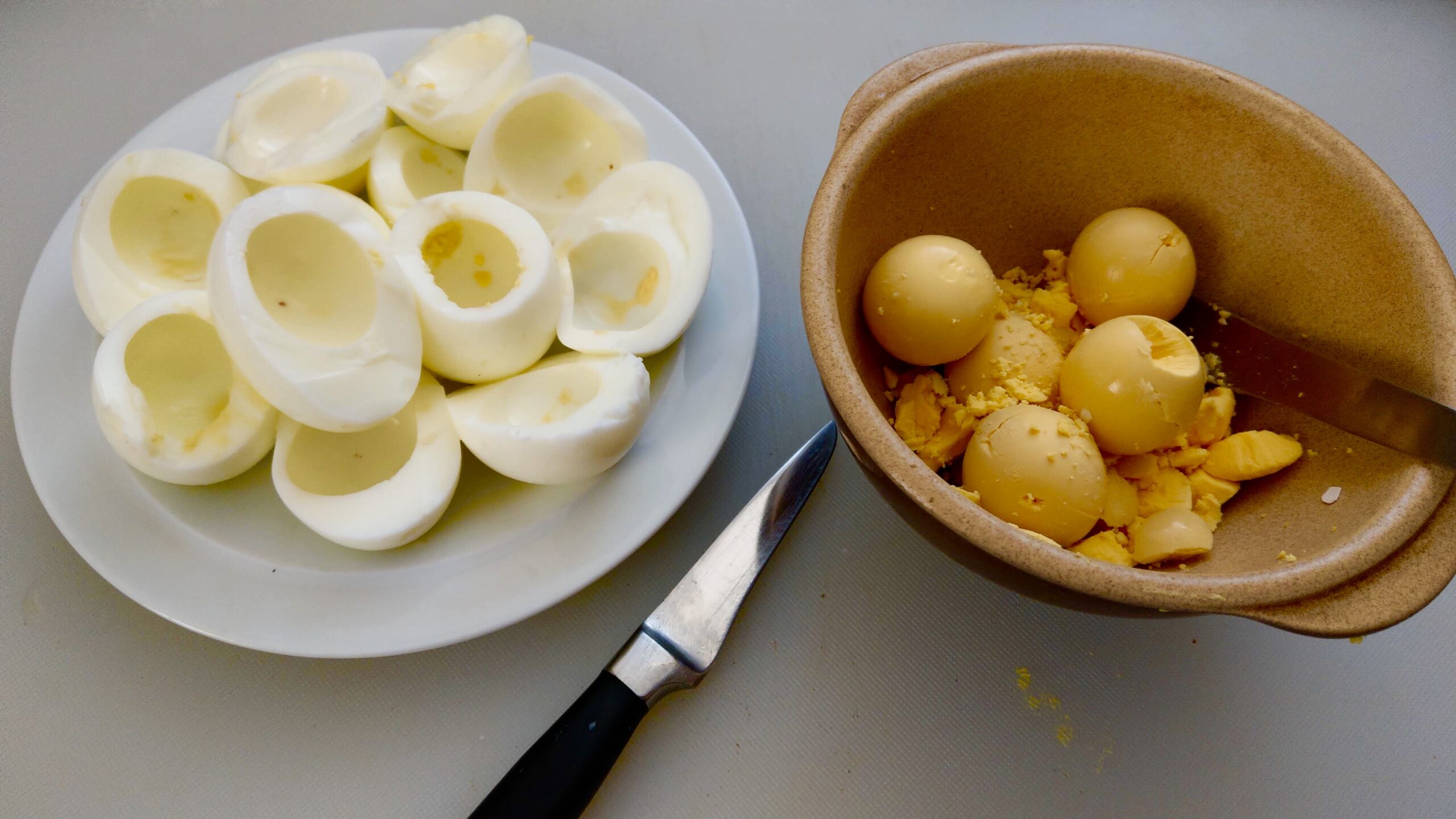
- Middle Kingdoms preferences vary regionally as to whether one halves the eggs the short way or the long way (and there are way too many folktales explaining the inherent superiority of each approach). Find your own road, and walk it.
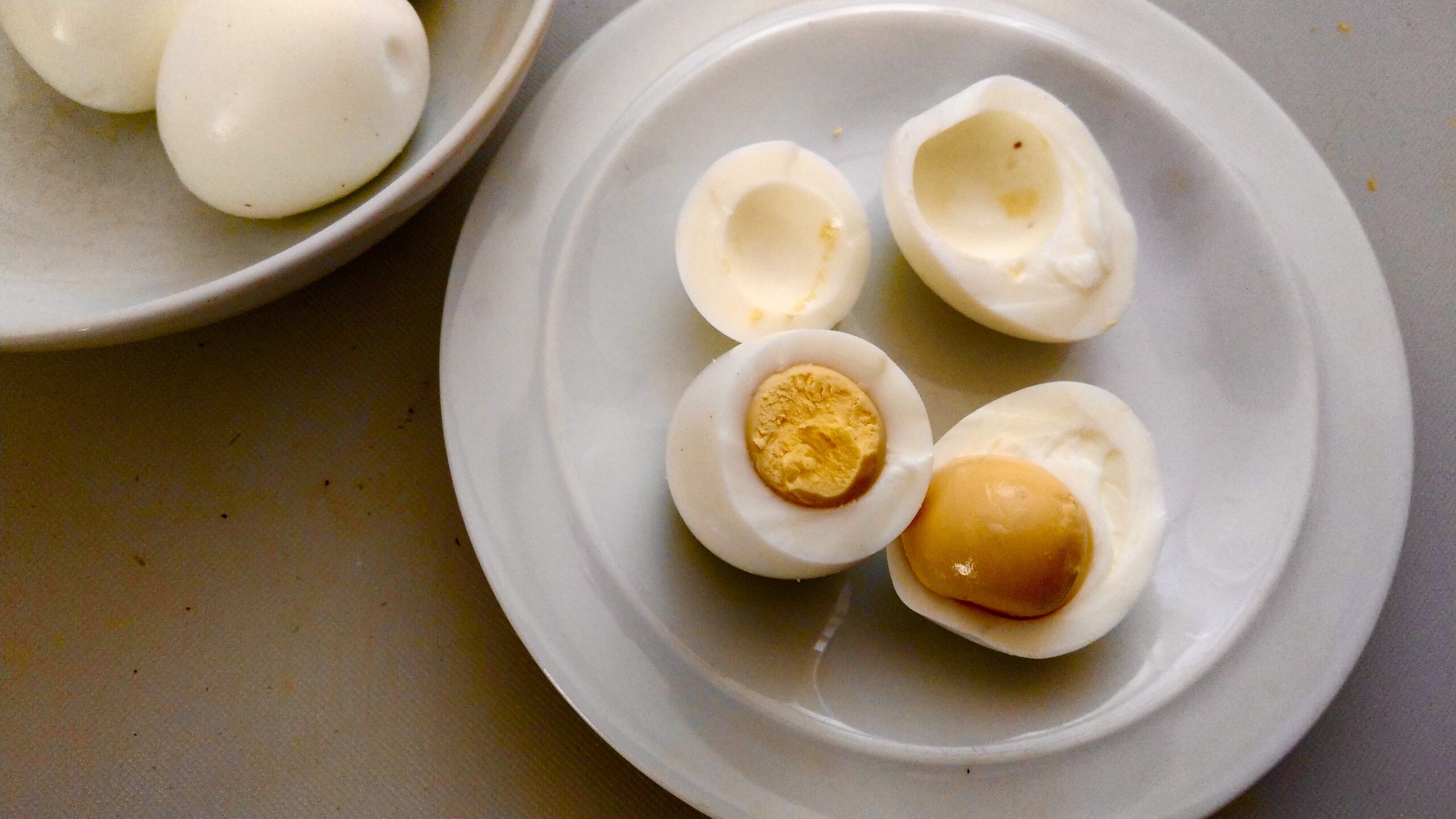
- Whichever way you walk, use a sharp knife to cut a little flat patch off the bottom of each egg-white half, so they won’t roll around on the serving plate and ruin your presentation. Set the emptied whites aside.

- With a fork, mash and crumble the egg yolks roughly. Don’t try to reduce them to a smooth paste. A little texture is seen as a positive in this recipe.

- Add the ground peppercorns and salt and mix in lightly.
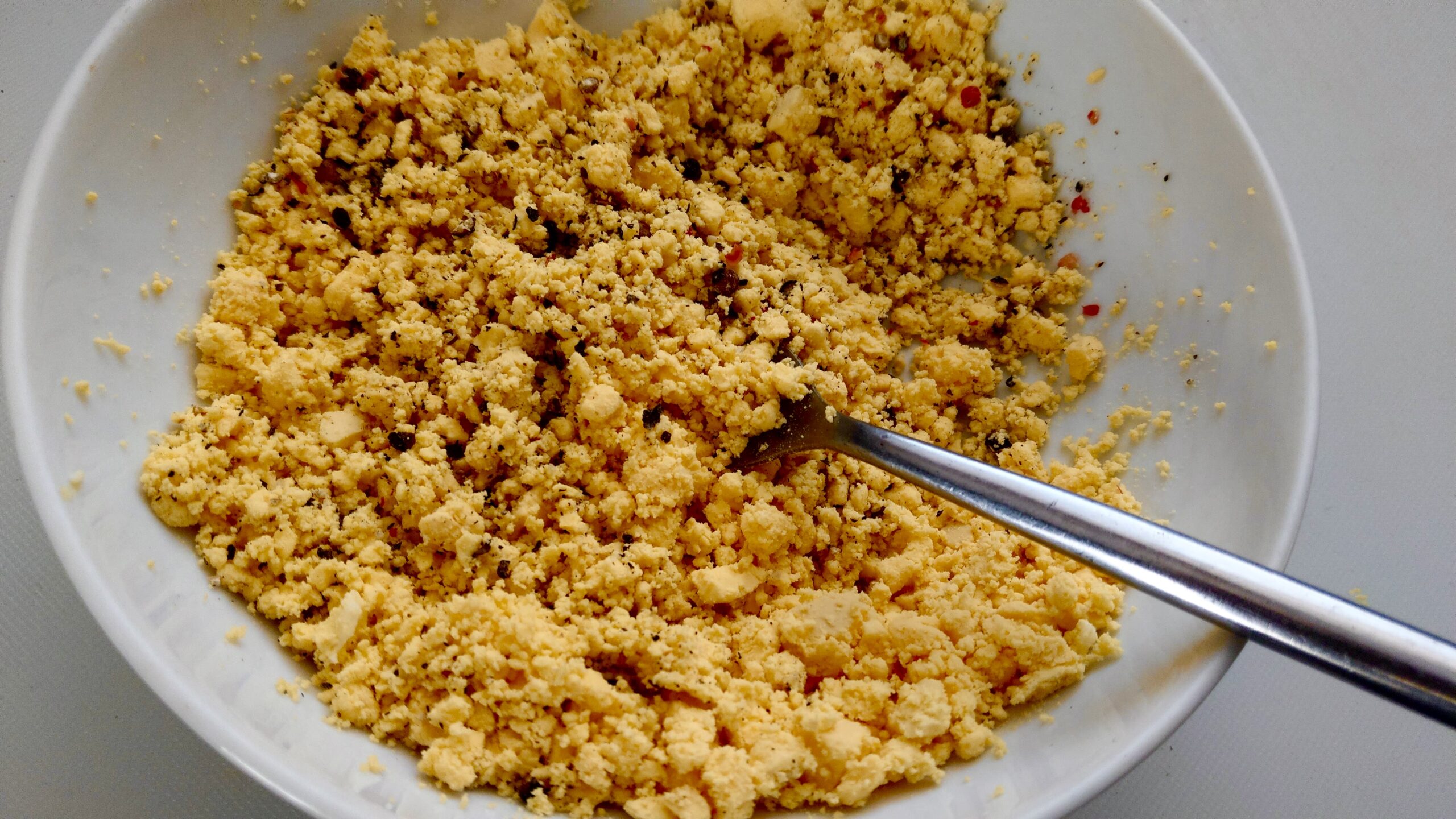
Now add the sour cream and blend it in gently. You’re aiming for a mixture that has a creamy cohesiveness but isn’t overly sloppy. …For this, you should get the thickest sour cream (or creme fraiche) you can lay your hands on. We’re desperately happy to be able to get this magnificent stuff from the Irish-based Polish/eastern European grocery chain Polonez.

- Finally, when the sour cream’s been combined, add the marigold and blend the mixture until the petals are evenly distributed through it.

- Now use a couple of small spoons to form rough balls from the egg-yolk mixture and settle them gently into the halved egg whites.

- Arrange the filled egg halves on a plate and allow to rest for an hour or so in a cool place (or refrigerate them, carefully covered, until you’re ready to serve). Then garnish them and serve them forth.

- Enjoy!
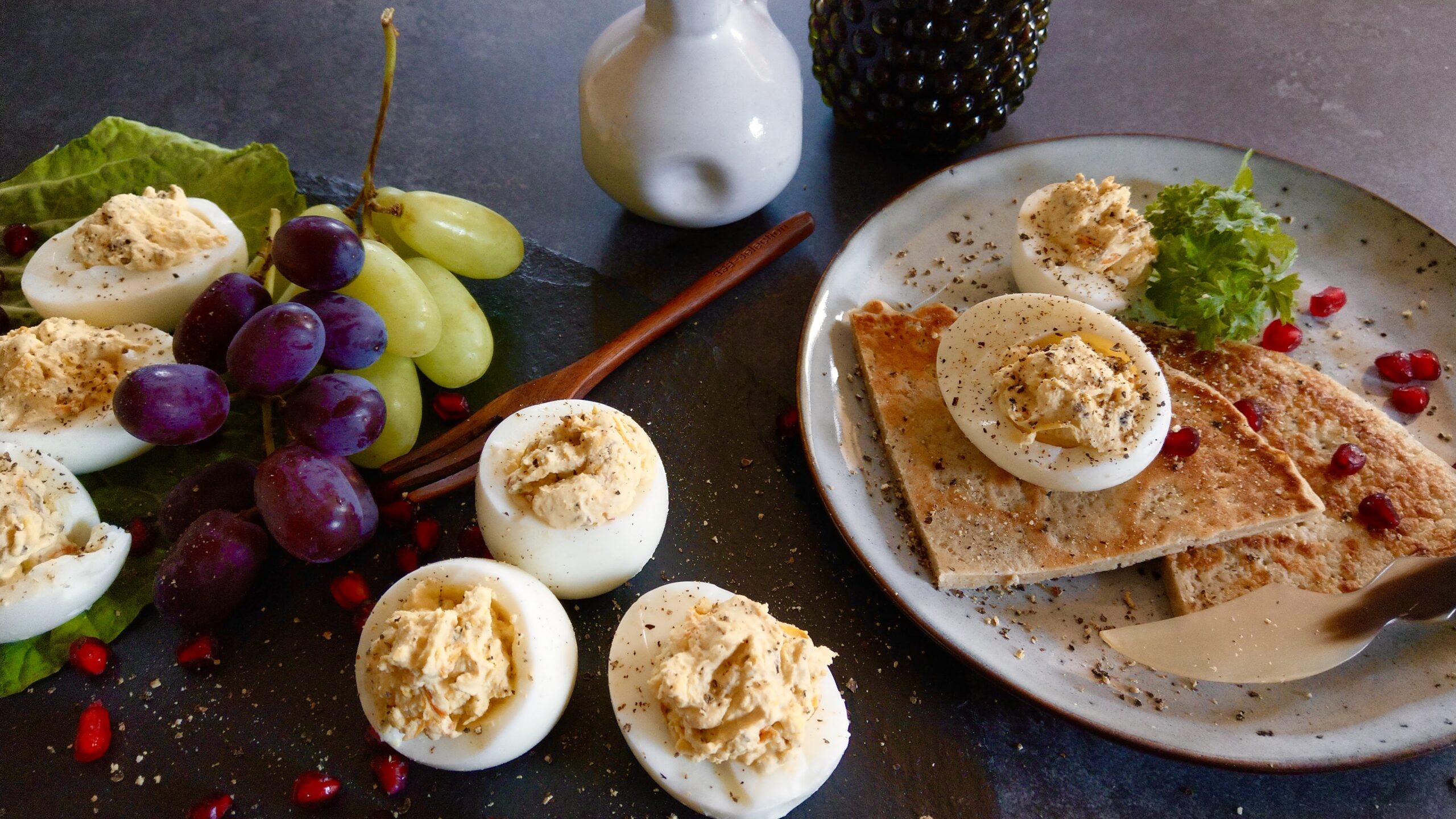
- Note: There is a tradition in eastern Steldin and parts of northern Darthen that if an egg splits during the filling process, it must be displayed in a position of honor on the dish. It’s thought to be a silent acknowledgement by the Queen of the World of the great Mistake she made during the Creation, and Her continuing efforts throughout the ages since to make amends for Her oversight. Either the oldest or the youngest guest at table eats it as a sign to Her of human beings’ willingness to help Her in the work of putting the world right… and (if they can) to forgive Her.
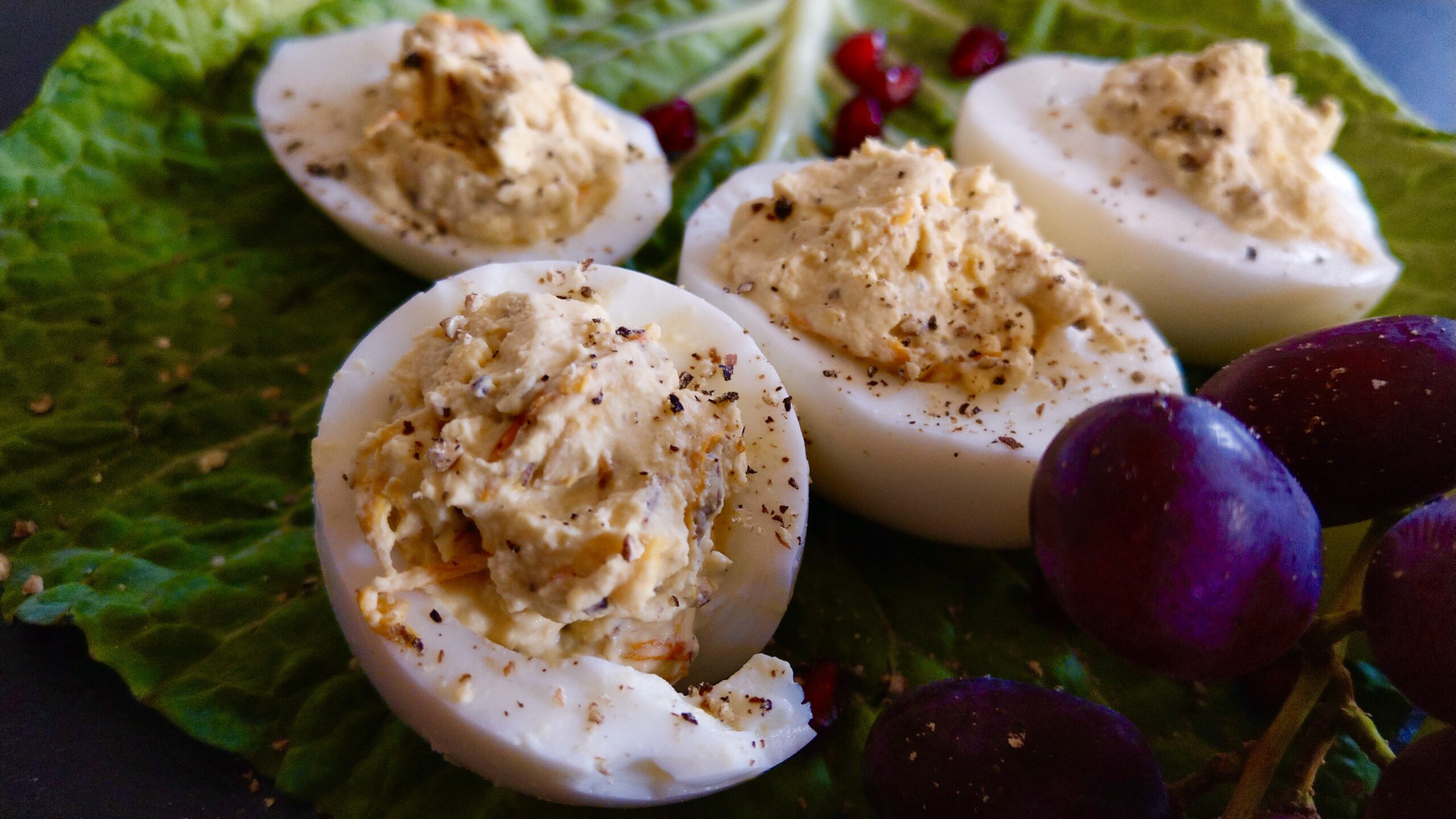
Eggs, dairy, spices

House Doctor, Continenta, Slated


